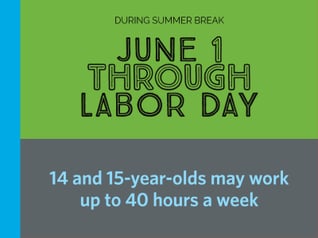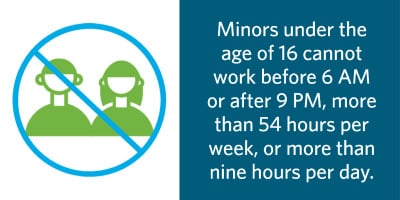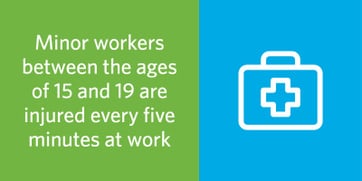New Heat Exposure Rules To Watch For This Summer
With summer temperatures consistently rising across the country year after year, new safety regulation development is underway at the state and...
4 min read
 Lindsey Sosa, SPHR, SHRM-CP and Tiffany Knudsen, SMS
:
May 31, 2022 10:30:00 AM
Lindsey Sosa, SPHR, SHRM-CP and Tiffany Knudsen, SMS
:
May 31, 2022 10:30:00 AM

As summer is fast approaching, many employers tap into a newly available talent pool for their seasonal positions – teenagers on summer break from school. Summer jobs can be a win-win solution for employers and young workers alike. Employers can fill open hourly positions that have been difficult to recruit for in the current competitive labor market. Teenagers can learn valuable skills that will assist them as they progress into adulthood - and earn some pocket money in the process!
However, there are many issues that employers must keep in mind when employing minor workers. State and federal law provide regulations that govern minor employment. Regulations require a minimum age for employment, hours they can and cannot work, required permission, and prohibited hazardous occupations. Below is an overview of state and federal laws that may cover your workplace:
 The FLSA prohibits the employment of children under 16 years old unless regulations have specifically authorized the position for minor workers aged 14 or 15. If the job is allowed for 14 and 15-year-olds, employers must ensure that the work hours do not interfere with the minor's education and the working conditions do not jeopardize the minor's health and well-being. During summer break, June 1 through Labor Day, 14 and 15-year-olds may work up to 40 hours a week, up to eight hours per non-school day, so long as they do not work before 7 AM or after 9 PM.
The FLSA prohibits the employment of children under 16 years old unless regulations have specifically authorized the position for minor workers aged 14 or 15. If the job is allowed for 14 and 15-year-olds, employers must ensure that the work hours do not interfere with the minor's education and the working conditions do not jeopardize the minor's health and well-being. During summer break, June 1 through Labor Day, 14 and 15-year-olds may work up to 40 hours a week, up to eight hours per non-school day, so long as they do not work before 7 AM or after 9 PM.  Idaho law allows children 12 years of age or older to work in certain occupations during school breaks. Children under the age of 14 are prohibited from working in certain businesses, and minors under the age of 16 cannot work before 6 AM or after 9 PM, more than 54 hours per week, or more than nine hours per day. Employers must retain records of the minor's name, age, and address.
Idaho law allows children 12 years of age or older to work in certain occupations during school breaks. Children under the age of 14 are prohibited from working in certain businesses, and minors under the age of 16 cannot work before 6 AM or after 9 PM, more than 54 hours per week, or more than nine hours per day. Employers must retain records of the minor's name, age, and address. In addition to adhering to compliant hours and occupations, employers must also consider extra precautions to protect minor workers. Young employees with limited work experience are often reluctant to report harassment or other types of prohibited workplace conduct. Employers should train seasonal workers (in addition to all employees) on unacceptable workplace behavior and where and how they should report possible harassment.
In addition to adhering to compliant hours and occupations, employers must also consider extra precautions to protect minor workers. Young employees with limited work experience are often reluctant to report harassment or other types of prohibited workplace conduct. Employers should train seasonal workers (in addition to all employees) on unacceptable workplace behavior and where and how they should report possible harassment. Adult employees working with minors should also receive additional training on appropriate behavior and expectations. Topics may include off-limit actions like "friending" minor employees on social media, driving with minor employees, interacting with minor employees while off-duty, and consuming alcohol with minor employees present.
 The safety of all workers is of paramount importance, but extra care is necessary to ensure teen employees' safety in the workplace. According to the National Institute for Occupational Safety and Health (NIOSH), minor workers between the ages of 15 and 19 are injured every five minutes at work. This is about twice the rate of injuries for workers over 24. When all employees from the top-down participate in safe work practices, it sets a good example for young workers.
The safety of all workers is of paramount importance, but extra care is necessary to ensure teen employees' safety in the workplace. According to the National Institute for Occupational Safety and Health (NIOSH), minor workers between the ages of 15 and 19 are injured every five minutes at work. This is about twice the rate of injuries for workers over 24. When all employees from the top-down participate in safe work practices, it sets a good example for young workers.
Employers must follow all applicable federal and state safety regulations for their industry and comply with all child labor laws, including prohibiting minor workers from doing certain hazardous job tasks. Employers must also provide safety training using words and language that teens can understand, including clear instructions for each task. Hands-on training is typically the most effective training method, and employers should avoid assuming that the young worker understands a job task if they don't ask questions. Employers should also continue to reinforce training and follow required safety practices such as the proper use of personal protective equipment (PPE). Consider implementing a buddy system, partnering teens with experienced workers, and ensuring that they are supervised closely.
Tell young workers what to do if they get hurt on the job and remember always to set a good safety example.

Employers looking to learn more about minor worker safety can visit NIOSH's Young Worker Safety and Health website or the #KeepTeenWorkersSafe campaign website for materials, resources, and information.
Archbright members have access to a comprehensive Minor Workers Keynote in the mozzo Resource Library, in addition to the ability to contact our HR and Safety Hotlines to talk through specific circumstances.

With summer temperatures consistently rising across the country year after year, new safety regulation development is underway at the state and...

Governor Jay Inslee passed the nation’s first long-term care insurance (LTI) for Washington employees last spring. The LTI program mandates a payroll...

Employers considering requiring their employees to get vaccinated against COVID-19, whether by policy choice or required by a federal, state, or...